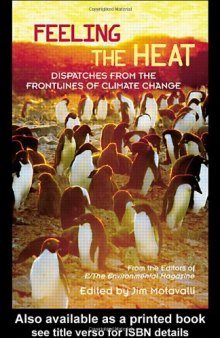دانلود کتاب Feeling the Heat: Dispatches from the Front Lines of Climate Change
by From the Editors of E/The Environmental Magazine, Jim Motavalli|
|
عنوان فارسی: احساس گرما : اعزام از خط مقدم تغییر آب و هوا |
 دانلود کتاب
دانلود کتاب
 جزییات کتاب
جزییات کتاب
Not so, argue Jim Motavalli and his colleagues. The intricacies of climate change and recent warming trends in remote places such as Alaska and the Antarctic reveal that the warming of the planet impacts us all already. In a selection of "dispatches" compiled by the editors of E/The Environmental Magazine, a distinguished group of environmental reporters traveled the world - from Australia to the Pacific Northwest, from China to Europe, to record scientific assessments and human experiences. What can we learn from their observations?
A case of severe human impact on the environment is vividly explored in "The Cost of Coal" in Mark Heertsgard's report from China. Rapid economic development comes at a very high price. For the time being, the prime energy source there remains fossil fuels, resulting in extreme air pollution. Thick smog covers the cities and people suffer from respiratory and other health problems. Yet, if the alternative is to freeze in unheated houses or slowing down the industrial advances, Chinese see no choice. Aware of CO2 greenhouse gas emissions almost rivaling those of the (highest emitter) USA, Chinese politicians and technocrats showed little sympathy for the global impact. They dismiss it as "the cost of progress". At the same time, Chinese authorities regulate industry towards high level of energy efficiency.
Closer to home for many readers is a wake-up call on raising sea levels. Motavalli and Barnes paint a devastating picture of what is in store for Greater New York from the underappreciated impact of global warming. Not only the tourist industries as the beaches of Florida or Fiji will suffer destruction, island states in the Pacific Ocean are already preparing for the exodus of hundreds of thousands of environmental refugees. The trends are unmistakable. On the other hand, examples from Europe provide a glimmer of hope. No longer waiting or sitting on the fence, Europeans have taken the lead in "planning ahead", proving that increasing use renewable energy and economic growth can be combined successfully.
Writing about insects and other creatures appearing in ecosystems where they don't belong, several articles demonstrate that the ecosystem balance is under threat. Warming ocean water results in fish and other sea animals moving out of their traditional habitats. Their food sources may not have done the same and new dangers may loom in the new environment. The food chain starting with the smallest critters is already interrupted with impacts on animals further up the chain only a question of a short time. While the field scientists interviewed for the articles remain cautious, stating that not all global warming should be blamed of human impact, the indications of increasing danger cannot be overlooked.
FEELING THE HEAT, while written by several authors, depicts a cohesive and coherent picture from some of the hotspots of global warming. Although at times depressing and exasperating, the underlying message is that of early warnings. The call on us has to be to do whatever we can to reduce human impact on the environment and climate. [Friederike Knabe]









 این کتاب رو مطالعه کردید؟ نظر شما چیست؟
این کتاب رو مطالعه کردید؟ نظر شما چیست؟
